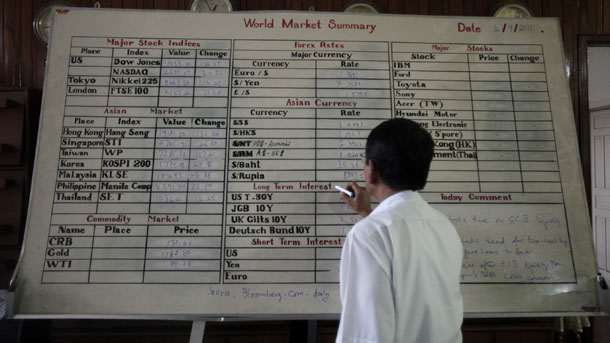Burma may have embarked on significant economic reforms in 2012 to make it a more investor-friendly place, but it has entered 2013 ranked in a global survey as an “extreme risk” for foreign companies doing business in the country.
Maplecroft’s “Political Risk Atlas 2013” assesses the dangers to investors of their businesses being seized by state authorities and ranks countries according to the level of political violence and other destabilizing factors.
Even though this survey was completed before the onset of the new intensive fighting in Kachin State—raising questions about the Naypyidaw government’s control of the army—Burma still ranks fifth in Maplecroft’s “extreme risk” countries for political violence risks. It shares the world’s worst top-10 slot with Somalia, Congo, Sudan, Afghanistan, Iraq, Libya, Central African Republic, Syria and Yemen.
“Political violence forms a key pillar of dynamic risk and constitutes a major destabilizing influence on the investment climate of affected countries,” say business risk analysts Maplecroft of Britain.
Burma is placed 9th most risky in a separate Maplecroft survey of 197 countries and the likelihood of state expropriation of private business.
“Despite the notable political and economic reforms currently underway in the country, this score reflects [Burma’s] historic poor performance in terms of the respect for property rights and previous incidents of nationalization, with no compensation paid in many cases,” Maplecroft’s senior political risk analyst Charlotte Ingham told The Irrawaddy in an email interview on Jan. 14.
“Although the country is now keen to attract foreign investment and thus is deemed far less likely to expropriate private property from foreign investors, there is still significant uncertainty surrounding the regulatory environment.”
However, Ingham said the passing of a new Foreign Direct Investment Law last November “has clarified several regulatory aspects for investors, notably in terms of production sharing contracts for energy companies, which should serve to improve [Burma’s] score in the medium term.”
And Maplecroft believes that the risk of resources nationalism—the wholesale takeover by the state of natural resources such as gas, oil, coal, gems and other minerals—has been reduced over the past year.
“The country is eager to attract investment and is wholly reliant on foreign technological capacity and financial resources to extract its natural resources,” Ingham told The Irrawaddy. “Barring the likely imposition of Domestic Market Obligations in the energy sector, which obliges companies to meet domestic demand before they are allowed to export oil or gas, it is unlikely that the government will deter investors with overt examples of resource nationalism or expropriations.”
But Maplecroft warns that the continued involvement of the state-owned former military regime-linked Myanmar Oil and Gas Enterprise (MOGE) in all exploration projects poses a hazard for investment. The failure to reform MOGE has been repeatedly criticized at home and abroad, and is considered in international industry circles to be the chief reason why major global oil companies have not yet entered Burma, especially those based in the United States.
“Further, the Foreign Investment Law has left the discretionary powers of the Myanmar Investment Commission, staffed by bureaucrats close to the military, unchanged,” Ingham told The Irrawaddy. “As a result, the government will continue to exert significant influence over natural resource production for the foreseeable future.
“The government is also likely to exert pressure on investors in the extractive industries to seek a greater share of revenue, or place stipulations on local content, particularly with regard to the employment of local workers and the purchase of locally manufactured goods for production. Indeed, present law stipulates that local workers must be given preference and that locally manufactured machinery must be used where possible, although a lack of human capital and the poor quality of locally manufactured goods will likely restrict the feasibility of imposing such conditions.”
The absence of an independent legal structure also heightens Burma’s risk status, and currently foreign investors are not protected by international treaties.
Burma has not yet signed up to the International Center for the Settlement of Investment Disputes or the New York Convention.
With the Burmese army seemingly unable to deal with the ethnic violence in Arakan but prepared to wage all-out war in Kachin State, Burma “faces crucial tests of its international credibility” this year, says Parag Khanna, a senior fellow at the Singapore Institute of International Affairs and a researcher with the New America Foundation.
“The military’s power is still pervasive, placing it somewhere on the spectrum between Indonesia, where military influence has been rolled back, and Pakistan, where the military still dominates,” Khanna said in a study report on Burma this month. “On the streets, it’s often difficult to know who is in charge.”
This year, Burma will host the World Economic Forum in June and the Southeast Asian Games in December. In 2014 it takes over the rotating chairmanship of the Association of Southeast Asian Nations.
Although most of Burma’s extreme risk bedfellows in the Maplecroft 2013 Atlas are in Africa or the Middle East, two of its neighbors are surprisingly named as posing similar-level risks from terrorism. Thailand and India are listed among 18 countries facing an “increasing trend for terrorism across some of the most promising growth economies.”
“While the potential economic gains from operating in these countries is still high enough to attract investors, the steps required to mitigate threats to employees, assets and supply chains is increasing the costs for business, including for insurance,” says Maplecroft.
Thailand is increasingly a major investor in Burma.

















